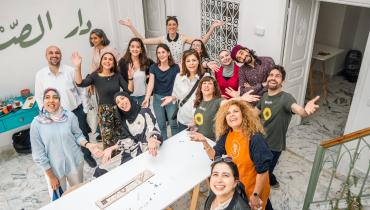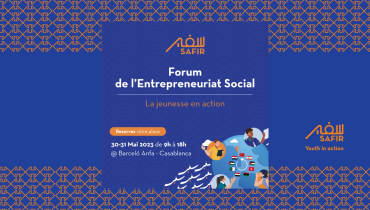The Period Rights Initiative - Ahmed Ismail

He looks back at his experience with Life Makers Foundation, one of Safir civil society organizations in Egypt.
Being actively advocating for the United Nations Sustainable Development Goals (SDGs) towards eliminating poverty, hunger, inequalities, and addressing the climate actions is one of my personal objectives.
Being selected to be a part of Safir program in Egypt allowed me to expose and understand the SDGs as well as Egypt Vision 2030, and the Sustainable Development Strategy for Africa 2063.
I was inspired by the trainers who have taken us into the journey of Safir programs, starting from the Climate Actions (SDG 13), Affordable and Clean Energy (SDG 7) and COP26 outcomes which limiting global warming to 1.5°C requires “rapid, deep, and sustained reductions in global greenhouse gas (GHG) emissions, including reducing global carbon dioxide emissions by 45 per cent by 2030.
Then we moved forward to No Poverty (SDG 1), and Zero Hunger (SDG 2) and reviewed of the national projects and initiatives such as Haya Karima which stems from a civilized responsibility and a human dimension before anything else, as its goal is greater than just being an initiative aimed for improving the living conditions and daily life of Egyptian citizens.
Moreover, we moved to Gender Equality (SDG5) we discussed the key barriers which face the women and girls in our communities in Egypt and areas that are essential pre-conditions for women's empowerment and achieving equality between men and women. In addition, we discussed the National Strategy for the Empowerment of Women 2030 in line with the UN’s sustainable development goals, and its key objectives for empowering them socially, economically, and politically.
"Me and my teammate, Sarah Ghoniem, initiated The Period Rights Iniative, which targets girls and women in low-income, rural communities and slum areas in Egypt."
The Period Rights Egypt Project will take three dimensions of right-based approach :
- Social media awareness campaigns to raise a better understanding of menstrual health and menstrual hygiene management (MHM) products, the used harmful homemade alternatives, and how is the period poverty affects girls and women's health, well-being, education, income, and their rights.
- Building period safe spaces in schools by equipping the schools in low-income communities and rural areas with menstrual products, and a private space to change and rest.
- Partnerships with governmental, NGOs, and private players to increase the momentum to address challenges related to menstrual health.







